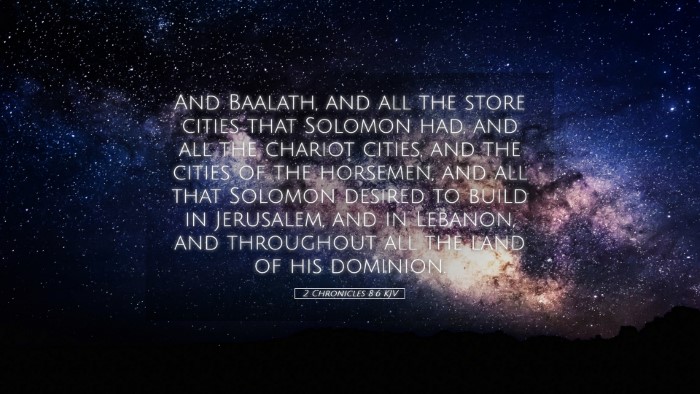Commentary on 2 Chronicles 8:6
2 Chronicles 8:6 states: "And he built the cities and gave them to the children of Israel." This passage is significant as it highlights various themes in the leadership of Solomon, including prosperity, fulfillment of God's promises, and the administration of God’s people. Below is a detailed commentary synthesized from public domain sources to provide deeper insights.
The Context of 2 Chronicles 8
The chapter is part of the larger narrative that describes Solomon's reign. It emphasizes how Solomon successfully established his kingdom through various undertakings, including building projects and diplomatic relationships. This chapter reflects both the material glory of Israel during Solomon’s reign and the spiritual responsibilities that accompany such prosperity.
Historical and Theological Background
Historically, Solomon is viewed as a type of Christ—one who is insightful, wise, and who brings peace. The construction of cities can be viewed as both a military strategy and a fulfillment of God's promise to Israel. Solomon's administration was characterized by both material success and religious neglect, setting the stage for future challenges in Israel's history.
Insights from Matthew Henry
According to Matthew Henry, this verse signifies Solomon’s accomplishments in organizing the land of Israel:
- “The cities he built were spoils taken from the enemies. He not only raised the walls, but made them fit for habitation and secured them.”
- Henry stresses that the success of these endeavors stems from Solomon's reliance on God's wisdom and strength.”
- “The Lord gives wisdom to those who ask, and Solomon indeed asked for wisdom to govern His people.”
Insights from Albert Barnes
Albert Barnes observes that the cities mentioned in this passage were essential not just for defense but also for economic development:
- “The cities built by Solomon were strategically located to enhance trade routes and facilitate economic prosperity for the nation.”
- “It is important to note that these cities served as a means for unifying the people and establishing a sense of national identity.”
- “Barnes also emphasizes the importance of leadership in a thriving community, noting that Solomon’s political acumen contributed to the stability of Israel.”
Insights from Adam Clarke
Adam Clarke adds depth to the understanding of this verse by focusing on its implications for the governance of Israel:
- “Clarke indicates that the act of building cities demonstrates Solomon’s commitment to providing a safe and prosperous environment for his people, which reflects God’s covenant with Israel.”
- “He also points out that such infrastructural developments were imperative in maintaining law and order, as well as providing a commanding presence amidst surrounding nations.”
- “Clarke further emphasizes that this is a fulfillment of divine promises given to the patriarchs about the prosperity of their descendants.”
Thematic Developments
This verse not only emphasizes physical developments but also spiritual implications:
- Promise Fulfillment: The children of Israel receiving cities embodies God's promise of land and settlement to their ancestors.
- Leadership Responsibilities: Solomon’s accomplishments raise questions on the nature of true leadership—balancing wealth and spirituality.
- Nation Building: The act of building cities represents the physical and spiritual fortification of God's chosen people.
Practical Applications for Today
The applications of this passage extend into the realm of contemporary ministry and leadership:
- Leadership: A reminder to leaders to build environments where faith can thrive, just as Solomon provided for Israel.
- Community Focus: Encourages modern-day leaders and pastors to engage in community development and provide for the holistic needs of their congregants.
- Sustainable Prosperity: Addresses the responsibility that comes with prosperity and the potential pitfalls of neglecting spiritual stewardship.
Conclusion
The passage in 2 Chronicles 8:6 serves as a rich source of understanding regarding the intersection of divine promise and human action in the establishment of the nation of Israel. Insights from notable commentators reveal a layer of complexity in Solomon’s actions—demonstrating responsible leadership, fulfilling God’s word, and laying a foundation for future generations.


